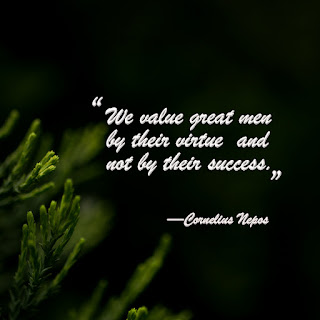And in the meantime, the elder son rode into the world to find the touchstone of the trial of truth ; and whenever he came to a place of habitation, he would ask the men if they had heard of it. And in every place the men answered, “ And not only have we heard of it, but we, alone of all men, possess the thing itself, and it hangs in the side of our chimney to this day.’ And then would the elder son be glad, and beg for a sight of it. And sometimes it would be a piece of mirror, that showed the seeming of things, and then he would say, 'And this can never be, for there should be more than seeming.' And sometimes, it would be a lump of coal, which showed nothing; and then he would say, 'And this can never be, for at least there is the seeming.’ And sometimes it would be a touchstone indeed, beautiful in hue, adorned with polishing, the light inhabiting its sides; and when he found this, he would beg the thing, and the persons of that place would give it him, for all men were very generous of that gift; so that at the last he had his wallet full of them, and they chinked together when he rode ; and when he halted by the side of the way he would take them out and try them, till his head turned like the sails upon a windmill.'And a murrain upon this business !' said the elder son, 'for I perceive no end to it. Here I have the red, and here the blue and the green ; and to me, they seem all excellent, and yet shame each other.And a murrain on the trade ! If it wrere not for the King that is a priest and whom I have called my father, and if it were not for the fair maid of the dun that makes my mouth to sing and my heart enlarge, I w'ould even tumble them all into the salt sea, and go home and be a King like other folk.' But he was like the hunter that has seen a stag upon a mountain, so that the night may fall, and the fire be kindled and the lights shine in his house, but desire of that stag is single in his bosom.And the elder son came upon the sides of the salt sea ; and it was night, and a savage place, and the clamour of the sea was loud. And there, he was aware of a house, and a man that sat there by the light of a candle, for he had no fire. And now, the elder son came in to him, and the man gave him water to drink, for he had no bread ; and wagged his head when he was spoken to, for he had no words.'And have you the touchstone of truth?' asked the elder son; and when the man had wagged his head, 'I might have known that,' cried the elder son, 'And I have here a wallet full of them!' And with that he laughed, although his heart was weary. And with that the man laughed too, and with the fuff of his laughter the candle went out.'And sleep!' said the man, 'for now I think you have come far enough; and your quest is ended, and my candle is out.'And now when the morning came, the man gave him a clear pebble in his hand, and it had no beauty and no colour, and the elder son looked upon it scornfully and shook his head, and he went away, for it seemed a small affair to him.And all that day, he rode, and his mind was quiet, and the desire of the chase allayed. 'And how if this poor pebble be the touchstone, after all?' said he ; and he got down from his horse, and emptied forth his wallet by the side of the way.And now, in the light of each other, all the touchstones lost their hue and fire and withered like stars at morning ; but in the light of the pebble, their beauty remained, only the pebble was the most bright. And the elder son smote upon his brow. 'And how if this be the truth?' he cried, ‘‘ that all are a little true?' And he took the pebble, and turned its light upon the heavens, and they deepened above him like the pit; and he turned it on the hills, and the hills were cold and rugged, but life ran in their sides so that his own life bounded; and he turned it on the dust, and he beheld the dust with joy and terror; and he turned it on himself, and kneeled down and prayed.'And now thanks be to God,' said the elder son, 'I have found the touchstone; and now I may turn my reins, and ride home to the King and to the maid of the dun that makes my mouth to sing and my heart enlarge.'And suddenly, there was a scream, and the elder son turned his head into the woods, and crept up. And he saw a fight between the cloaked troops, and a group of people, whom by their features he recognized as an armed group. The entire cloaked troops was slaughtered, and the only one left to live was a woman. And he thought, 'And I will help her; and what should I do?' And he knelt down and prayed, for he knew that there was no power but Him.And he drew his sword, slashing down the foes. And he found a woman wearing the niqaab or ruband, and who said, 'May there be a thousands goods to you my Prince!' And the elder son asked, 'How do you know I am a prince?' And the women in niqaab replied, 'From your manners, you can not lie to me!' And they told each other their experiences, and the elder son said, 'And I will take you back to your country, but first, come with me to the King.' And the woman in niqaab wagged her head.And apparently, the woman in niqaab, had a lovely voice, and on the way, she sang,Age to ageI feel the callMemory of future dreamsYou and I, riding the skyKeeping the fire brightFrom another time and placeI know your nameI know your faceYour touch and graceAll of time cannot eraseWhat our hearts remember staysForever on a song we play *)And for a moment, the elder son was astonished, 'The song!' And he shook his head, 'Nay, nay! Right now, in my mind there are only three shadows, the maid, the maid and the maid, basically the maid!' And sometimes, you didn't notice your glasses on your head, and looking for it everywhere. And a wise man said, 'Our eyes can see what is far away, but somewhat we cannot see, the sore on the tip of the nose.'And they came to the dun. And when they came into the hall, there was his brother on the high seat and the maid beside him; and at that his anger rose, for he thought in his heart, 'It is I that should be sittingthere, and the maid beside me.''Who are you?' said his brother. 'And what make you in the dun?''I am your elder brother,' he replied. 'And I am come to marry the maid, for I have brought the touchstone of truth.' Then the younger brother laughed aloud. 'Why,' said he, 'I found the touchstone, and married the maid.'Now at this the elder brother grew as gray as the dawn. 'I pray you have dealt justly,' said he, 'for I perceive my life is lost.''Justly?' quoth the younger brother. 'It becomes you ill, that are a restless man and a runagate, to doubt my justice or the King my father’s that are sedentary folk and known in the land.''Nay,' said the elder brother, 'you have all else, have patience also ; and suffer me to say THE WORLD IS FULL OF TOUCHSTONES, AND IT APPEARS NOT EASILY WHICH IS TRUE.''I have no shame of mine,' said the younger brother. 'There it is, and look in it!'So the elder brother looked in the mirror, and he was sore amazed; for he was an old man, and his hair was white upon his head; and he sat down in the hall and wept aloud.'And now,' said the younger brother, 'see what a fool’s part you have played, that ran over all the world to seek what was lying in our father’s treasury, and came back for the dogs to bark at, and with this 'radical-terrorist' niqab woman. And I that was dutiful and wise sit here crowned with virtues and pleasures, and happy in the light of my hearth.''Methinks you have a cruel tongue,' said the elder brother, and he pulled out the clear pebble and turned its light on his brother ; and behold, the man was lying, his soul was shrunk into the smallness of a pea, and his heart was a bag of little fears like little scorpions, and love was dead in his bosom. And at that the elder brother cried out aloud, and turned the light of the pebble on the maid, and lo ! she was but a mask of a woman, and withinsides she was quite dead, and she smiled as a clock ticks and knew not wherefore.And he paused for a moment, there was something he had forgotten. And then turned pebble on the woman in niqab, and there, standing a Princess, in all her grace, and in all her perfect beauty. And he approached her and said, 'Take off your niqab for a moment, so I can recognize you!' The woman took off her niqab, and it was true what he had witnessed.Holding the niqab woman's arm, he said to his brother, 'Oh, well, I perceive there is both good and bad. So fare ye all; and I will go forth into the world with my pebble in my pocket.’ And then, as he walked away, he said to the woman, 'And I will delivered you home!'And both rode, and along the way, both sang,Burn that page for meI cannot erase the time of sleepI cannot be loved, so set me freeI cannot deliver your loveOr caress your soulSo, turn that page for meI cannot embrace the touch that you giveI cannot find solace in your wordsI cannot deliver you your loveOr caress your soul *)And so, the Prince and Princess, fell in love, and got merried, and lived happily ever after'."And before she took her leave, the Moon said, "Ali ibn Abu Talib, radhiyallahu 'anhu, said,إِنَّ الْحَقَّ والباطل لا يُعْرَفان بأقدار الرِّجَالِ اعْرِفِ الْحَقَّ تَعْرِفْ أَهْلَهُ واعْرِفِ الباطل تَعْرِفْ من أتاه'Verily, the truth and falsehood are not recognized by the measure of men. Know the truth and you will recognize its people. Know the falsehood and you will recognize one who brings it.' [Ansāb al-Ashrāf]Indeed, the Truth has more power in this Dunya and the Hereafter, and to those people who speak the truth, Allah's blessing will be on them. And Allah knows best."
Citations & References:
- Robert Louis Stevenson, Fables, Charles Scribner's Sons
- William J. Rolfe, Litt. D, Shakespeare's Comedy of the Merchant of Venice, American Book Company
*) "Star Sky" written by Thomas J. Bergersen & Felicia Farerre
- Robert Louis Stevenson, Fables, Charles Scribner's Sons
- William J. Rolfe, Litt. D, Shakespeare's Comedy of the Merchant of Venice, American Book Company
*) "Star Sky" written by Thomas J. Bergersen & Felicia Farerre















